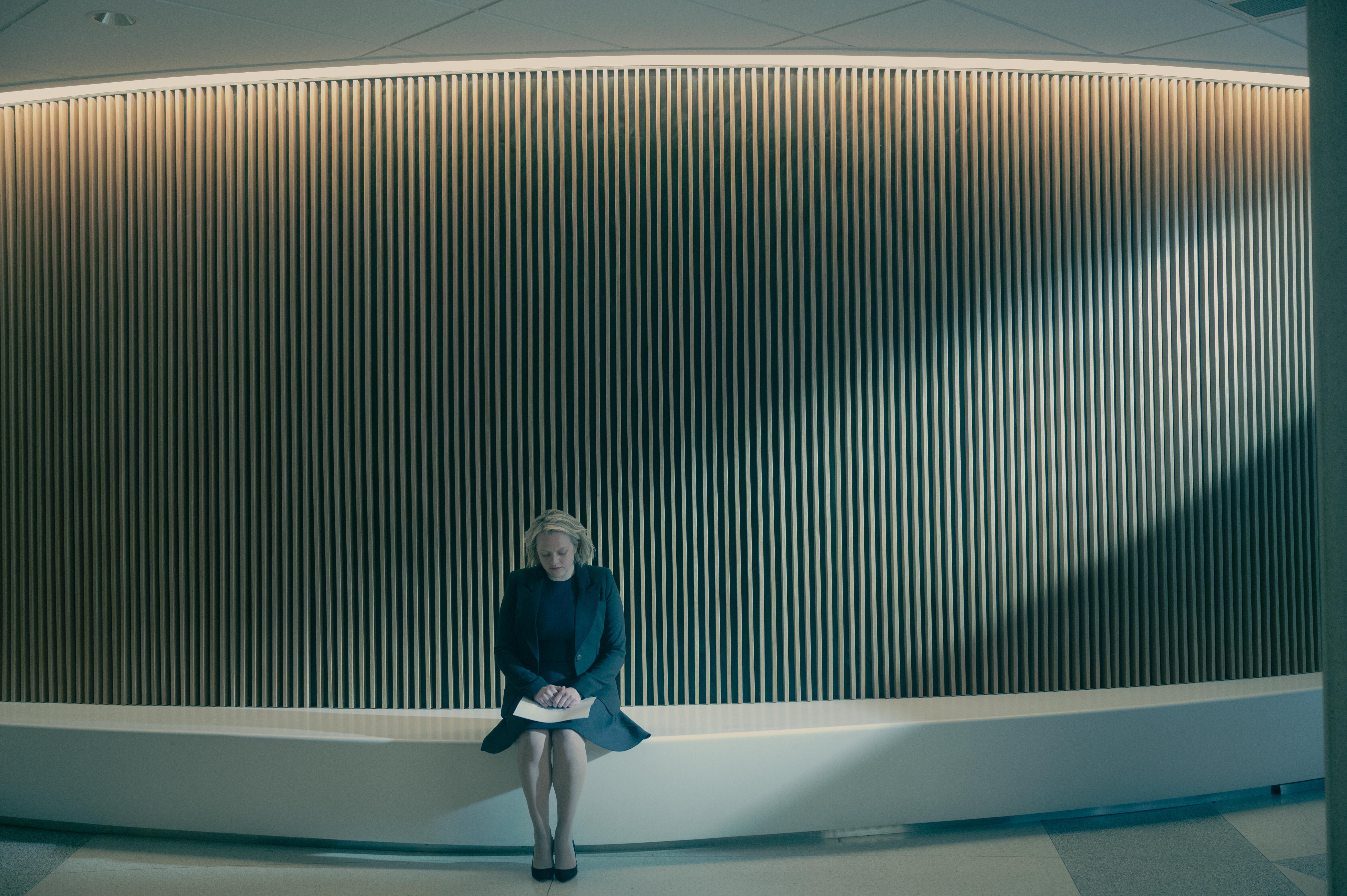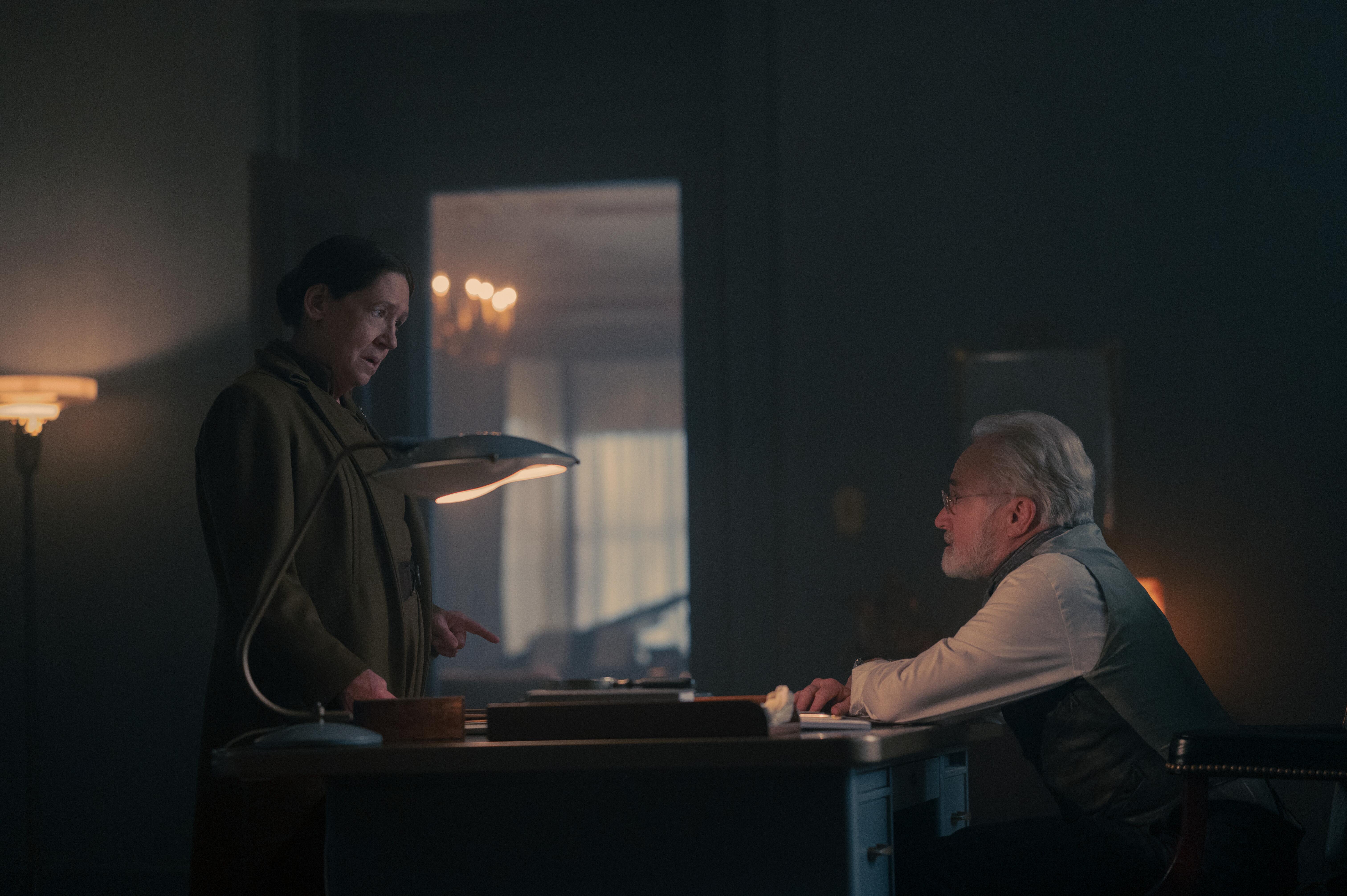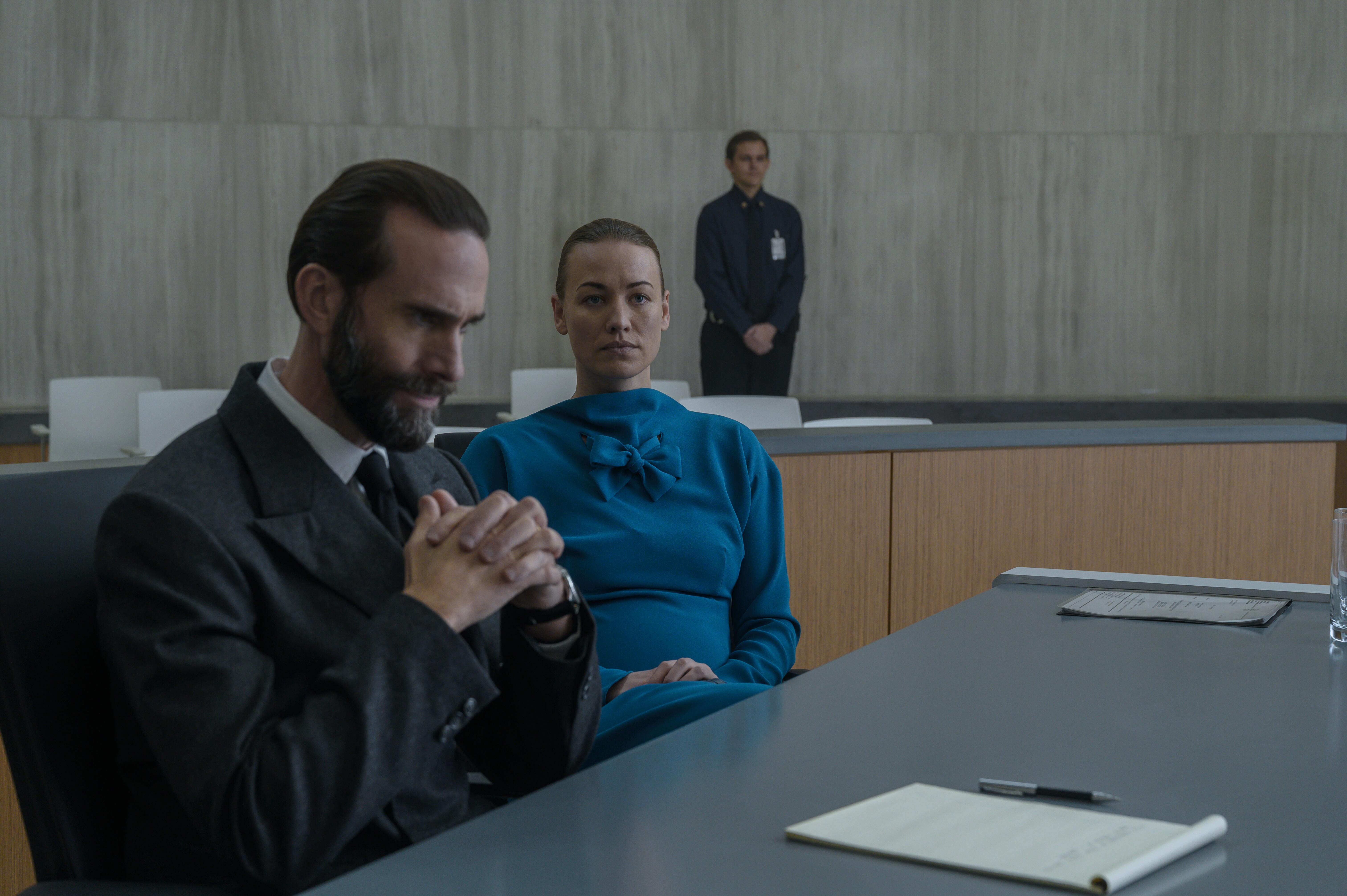What to Watch Verdict
Some very powerful moments are slightly derailed by a few contrived leaps, but Elisabeth Moss delivers in front of and behind the camera again.
Pros
- +
🔴The exploration of trauma and how to "move on."
- +
🔴Emily is finally given something to do.
- +
🔴The return of missing in action character.
- +
🔴Elisabeth Moss's direction is confident and includes some beautifully shot scenes.
Cons
- -
🔴Why is Fred allowed to speak for so long in court without being interrupted (and therefore gaining power).
- -
🔴Lawrence calls June "likable" but from an audience POV she is being a steam roller.
This post contains detailed spoilers for The Handmaid's Tale, "Testimony".
Read our last review here.
How do you move on after living in Gilead? This is a central question in “Testimony” and conflicting approaches derail an already precarious situation. It is also Elisabeth Moss’s second time behind the camera this season (and a third next week) and she once again demonstrates an understanding of The Handmaid Tale’s visual language. Overhead shots of circular patterns are a reminder of the cyclical nature of this world — even in Canada — and the white lamps in the library purposefully resemble the bonnets they wore. The ex-handmaids and Marthas are no longer living in a totalitarian state, but it is not a simple case of changing clothes and reclaiming your name. Moving on is far easier in terms of physical space and while June (Moss) is free from the brutal landscape, Gilead has irrevocably changed who she is.
Bookending "Testimony" with Moira’s (Samira Wiley) group sessions presents polarizing methods, and June’s arrival is the great disruptor. Anger consumes her every fiber, and the disregard for Moira’s mindful approach turns everything upside down. It was never going to be easy, but Aunt Lydia’s (Ann Dowd) observation that June’s presence corrupts and destroys everything is supported by how the former handmaid steamrolls the careful process Moira has mapped out. Aunt Lydia’s argument is presented in bad faith to Janine (Madeline Brewer) — she’s not dead! — but she also isn’t wrong when juxtaposed against the scenes in which June’s influence takes control. Anger, as Moira notes is a valid emotion and one that should not be ignored in order to heal, but June’s approach is self-motivated.

June also isn’t entirely in the wrong either and what “Testimony” highlights is that more than one thing can be true at the same time. “Why does healing have to be the only goal?” June asks in the final scene, laying out why they have a right to dig into the all-consuming rage. An uninvited attendee to the group session at the start of the episode spurs this project on as the Aunt who reported Emily’s (Alexis Bledel) romantic relationship wants to talk. This episode dives back into the past through June’s witness statement in court and the torment Emily was subject to. In the third ever episode, Emily’s punishment for the forbidden liaison is female genital mutilation, and as last week’s conversation about sex implied, she hasn’t been intimate with her wife since returning. The other woman (a Martha) was strung up on the wall for breaking the Gilead rules and this imagery comes full circle.
Instead of letting Emily process this in her own time, June pushes her friend into telling her who Iris Baker (Carly Street) is. Emily knew her as Aunt Irene and while she didn’t inflict torture akin to Aunt Lydia, what she did is deplorable. June brings Iris into a later group session — she claims she found her outside but I don’t know if I believe this — and they replicate the ritual in which a handmaid would sit in the middle of the circle to be judged by her peers. For the second week in a row, a woman gets down on her hands and knees to plead forgiveness and she is not granted what she seeks. Iris was feeling fine about her new life until Emily showed up in Canada, reminding her of what she had done, and this quest for absolution is motivated by wanting to feel better. It has nothing to do with Emily’s pain, and it is hard to sympathize with a woman who is not willing to put the work in and wants a quick fix. But Iris could be an important witness, and Moira suggests bringing down the Gilead power structure is the ultimate act of revenge.

Moss builds up the anticipation when Emily drives to see her former Aunt; dread builds with every prolonged moment. It isn’t a surprise when Iris’s dead body appears in the frame, and Emily’s impassive reaction is hard to read. “I feel amazing,” Emily emphatically states during the ex-handmaid therapy before adding that she hopes she had something to do with Iris dying by suicide. It is a dark but honest statement and this is when Moira knows she has lost this group’s attention for now. June smiles and is thrilled when everyone (bar her bestie) wants to stay to discuss their revenge fantasies.
If the episode had ended there, it would be an incredibly troubling closer, however, there is an additional scene that suggests June will not get stuck in fury. After another intimate moment with Luke veers toward a repeat rage-fueled encounter, he shuts it down quickly. He had mentioned Hannah and June’s way of suppressing this conversation is sex, but she cannot do this every time. After the vengeance discussion session, June comes home ready to tell Luke what really happened the last time she saw their daughter. She crossed the line with him in “Home” and she cannot go on with this secret eating away.
The latest updates, reviews and unmissable series to watch and more!

“Testimonials” is predicated on this notion of moving forward and Moira even explicitly says that they are all searching for ways to do this. The problem is there is an element of who benefits from this act and what is required to make a person feel like they can shed a painful past. Iris Baker needs Emily’s forgiveness to gain peace, but this act of contrition will not help Emily “get over” the intimacy issues or the loss of the Martha she was in a relationship with. June is also using Emily and the other former handmaids to channel her horrifying experiences as she feels solace to hear others talk in a way she identifies with.
And then there is Luke, who is trying to be a good husband but is also asking for more than June can give. After all these years of searching, it is understandable why he wants a quick fix so they can resume some sense of normalcy. However, even though he thinks he is making an effort, his comments about her resembling a stranger are rather myopic. He obliquely mentions bedroom issues to Moira (this is a whole other conversation and Luke is not to blame for her aggression) and thinks if he knew what she went through then that would help. He ignores June’s request and goes to court to hear Fred (Joseph Fiennes) and Serena Joy Waterford’s (Yvonne Strahovski) confirmation of charges hearing. His presence could have distracted June and surely he could’ve asked for a transcript.
This isn’t even the actual trial and it has already gone off the rails thanks to Fred getting free reign to talk up the fertility wonders of Gilead. His dutiful wife Serena sits by his side in the teal uniform and her pregnant belly as visual support to his miracle affirmations. Despite his lawyer being told to keep her client under control, he still fires off this politically dangerous missive. The pair are later greeted by fans rather than protestors when they venture outside and he was gifted a platform to rebrand as a savior. When they are met with placards proclaiming their innocence, one white woman is wearing a pink knit hat and this doesn’t feel like a coincidence.

It comes after June has read her statement, which is effectively told through June and June alone. The camera pushes in steadily, beginning with a wider shot before ending up on a close-up when June talks directly to us about the women (and friends) that have been lost. The fourth wall breaking is a striking (and uneasy) choice by Moss before this scene transitions into a sermon from Fred. What might feel like a CliffsNotes version of the previous three seasons and could easily be dismissed as hearing something we already know is a stirring recollection of the horrors she has gone through. Her choice of language is purposeful — rape for Fred and Serena, intercourse to describe the first time with Nick, and sex (against both of their wills) for Mr. Lawrence — and the only instance she really trips over words is before she mentions Nick for the first time. Of course, she doesn’t mention her ongoing relationship with the Waterford driver as she knows this will get back to Gilead (and it isn’t about him) and Lawrence (Bradley Whitford) confirms that Gilead has access to the testimony.
Despite this previous horrifying power flex by Fred, Lawrence continues his dance with the society he built and June’s popularity comes up when he has to tell Aunt Lydia to chill out with her taser usage — after she lashes out at a fellow aunt. Lawrence as a means to placate offers up Janine to get her aggression out but little does he know that Janine is her favorite (those who have read Margaret Atwood’s sequel to The Handmaid’s Tale will perhaps wonder whether Janine is set for a path in The Testaments). Their reunion is combative at first as Janine is thrilled that June made it to Canada and this is when Lydia suggests she was purposefully left behind. Instead of beating or electrocuting her, the Aunt embraces the handmaid she views as a daughter. Lawrence is a strategic player, but this is one scenario he didn’t factor in.
Confronting the past was never going to be easy and there is a lot going on in this episode as we head into the final stretch of Season 4. Lawrence calls June likable, and while she might have an impressive talent for building quick bonds, it is also impossible to ignore her inability to even consider what Moira has been building because it doesn't match her fury — not to mention the resistance members in Gilead who loathe her. Divides now exist between friends and when it comes to fighting the Waterfords newfound popularity, it will help if everyone is on the same page.
Emma Fraser spends most of her time writing about TV, fashion, and costume design; Dana Scully is the reason she loves a pantsuit. Words can also be found at Vulture, Elle, Primetimer, Collider, Little White Lies, Observer, and Girls on Tops. Emma has a Master’s in Film and Television, started a (defunct) blog that mainly focused on Mad Men in 2010, and has been getting paid to write about TV since 2015. It goes back way further as she got her big start making observations in her diary about My So-Called Life’s Angela Chase (and her style) at 14.


